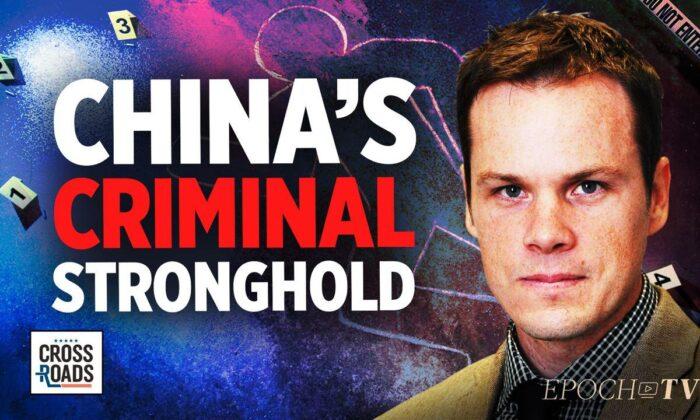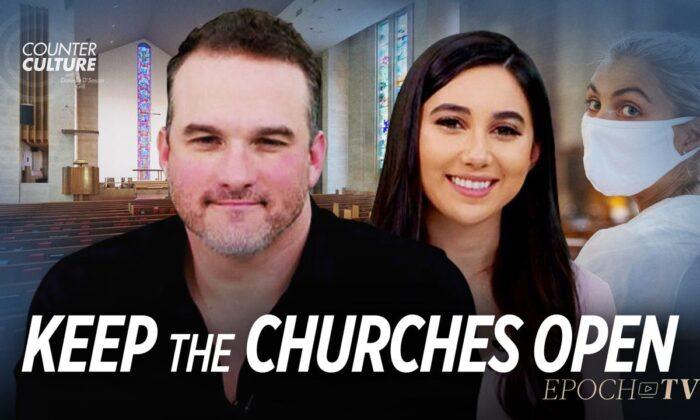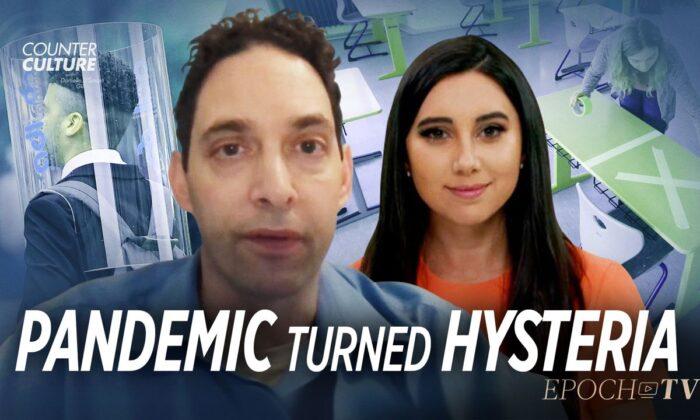So much has gone wrong in the last eight months that it’s difficult to keep a running tab of all the bad things happening in the United States. There’s the crisis at the southern border, inflation that shows no sign of ebbing, rising gas prices, a struggling economy, labor shortages, fallout from Afghanistan, and mass evictions looming in the not-too-distant future. Congress is trying to pass two massive spending packages, Biden is ruling by executive order, Republicans refuse to raise the debt ceiling (good for them, though we all know they’ll eventually cave), the British and French are openly cross with us about different things, and the media still won’t acknowledge that Hunter Biden’s laptop is not only real but contains a lot of damning evidence that could easily compromise our president.
Drukier’s first guest is a hip-hop artist, actor, speech therapist, and podcast host who has taken upon himself the grim task of keeping a running tally of the number of children under the age of 13 who have been killed since the massive uptick in violence began in 2020. As Drukier explains, the FBI’s statistics show that roughly 5,000 more murders occurred in 2020 than 2019, a 30 percent increase, and far too many of those killed were children. The overwhelming majority of these children were minorities, and one has to wonder why so little has been made of their deaths with the continuous chant of “Black Lives Matter” last year. Drukier’s guest, Leonydus Johnson, certainly thinks these children’s lives mattered, so he compiled a list of the 78 children killed in 2020 to remind everyone of the collateral damage from the increasing violence in inner cities. He’s continuing the list with the children killed this year as well, and it’s already up to 55.
Johnson is an outstanding young man who very clearly cares deeply for the communities impacted by this growing violence. The stories of the children being killed rarely make it past the local news into national reporting, and even Johnson didn’t know how big this problem was until he really started looking into it. He expresses his shock at just how many kids under the age of 13 died last year as a result of street violence, having first become aware of the problem after a handful of children were killed last summer in Chicago and wondering why he hadn’t heard of it before. His list scrolls by as he discusses the research he did into the death toll, and the ages and faces of the victims is shocking. They’re all average kids, all so young, but they’ve been killed by stray bullets in their living rooms, at the park, at funerals and birthday parties, or while waiting at the McDonald’s drive-through. The loss of these children is heartbreaking.
The primary cause of this street violence is what Johnson calls “hood culture,” which is well documented but can’t be criticized without inviting cries of racism. Johnson pinpoints the long list of behaviors contributing to this culture that keep inner-city residents trapped in a cycle of violence, including single-parent households, learned helplessness, rejection of education and personal responsibility, and a victimhood mentality. He also discusses the way hood culture has become synonymous with black culture, even though they are in no way the same thing. He is absolutely correct in saying that this culture has to do with behaviors, not skin color, and that anyone who lives their life based on the rules of hood culture is going to have a much harder path than someone who takes personal responsibility, values education, and doesn’t see themselves as a victim. The taboo surrounding the frank and open discussion of hood culture has kept generations trapped in this cycle of violence, as it has somehow become the epitome of what it means to be black. For many, it is more important to defend this idea of “authentic blackness” than it is to break the cycle and save children from being shot to death in their beds.
Johnson is fighting hard to break the association between the behavior and the color of someone’s skin, as they are not one and the same. He gives a short list of some of the greatest examples of successful black Americans in our country (really, Americans in general), bringing up Thomas Sowell, Glen Loury, and Clarence Thomas, who should be role models for everyone, but especially members of the black community. Instead, they are called Uncle Toms and other vile slurs, which Johnson really doesn’t understand. They are wonderful examples of how outcomes are dependent on behavior, not skin color, and how far someone can go if they reject what Johnson describes as a degenerate lifestyle. Having grown up in a small town in Ohio with a tiny minority population and then joining the hip-hop world, Johnson has seen firsthand the differences in outcome between those who embrace hood culture and those who reject it, and he has clearly made it a goal to push people of all races to reject it.
The first Q&A follows Johnson’s interview and centers around whether or not religious Americans are respected today. “The Nation Speaks” really does a solid job at finding respondents for these kinds of questions, as the answers range from “absolutely” to one man’s very staunch opinion on Catholic priests molesting little boys. It’s an excellent representation of the different opinions held by citizens across the nation, and it’s always interesting to see how the regions where the respondent live likely influenced their response.
The second interview of the episode deals with the COVID-19 pandemic and how it has allowed governments around the world to curtail freedom in the name of safety. Steve Simpson of the Pacific Legal Foundation joins Drukier to talk about the many ways the U.S. government has forced itself into our lives, and whether the kind of overreach we’ve seen is legal. She mentions workplace restrictions, seating arrangements in schools, and limits on gatherings as just a few of the ways the federal government has intruded on our freedoms, though her first question to Simpson focuses on the OSHA vaccine mandates.
Simpson adds his voice to the growing number of lawyers and legal analysts who have been quick to point out that what Biden is doing falls outside his purview as president. The Democrats only seem to remember that Congress is in charge of passing laws when a Republican is in the White House, but when someone on their team resides at 1600 Pennsylvania Avenue, anything goes. Simpson likens mandating vaccines through OSHA’s emergency powers to using the CDC for the rent moratorium, as both are improper uses of the organizations to push items of Biden’s agenda that should go through the legislative branch. OSHA, after all, isn’t about public health the same way the CDC isn’t about housing. Whether the courts uphold the mandates or not, Simpson certainly feels these regulations should go through Congress and not be implemented via vague emergency power dictates.
Simpson also feels the OSHA mandate is very closely related to the eviction moratorium in the way it’s been handled. Tenants’ rights advocates have had a wish list of items ready to go to stop evictions as soon as the right crisis came along, and just had to tweak some of the proposals they’d already written. The moratorium was struck down by the Supreme Court as it was well outside the scope of the CDC, but Simpson isn’t as sure that will happen with the OSHA vaccine mandate simply because OSHA’s scope is broader. Regardless, he thinks the parallels between the two orders are obvious.
Having discussed two specific, recent examples of federal overreach, Drukier turns the discussion towards the smaller steps many governments have taken to whittle away individual freedoms. We started with two weeks to flatten the curve, then mask mandates, and now we’ve reached vaccine passports and mandates, with six-month vaccine boosters in perpetuity likely right around the corner. Simpson finds this pattern very troubling, as Americans have quickly gotten used to the government telling them where they can go, what they can do, what they have to wear, how many people they can have at their house, and now what they have to put in their bodies in order to participate in society.
Most concerning to Simpson is that the majority of these regulations have not gone through the legislature but have again been handed down via the executive branch as various orders and edicts. While the idea of one person having that kind of dictatorial power over the masses used to be universally understood as a very bad thing, the last 18 months have gradually worn many down to easily accepting that this kind of tyrannical rule is for their own good. Simpson reiterates at the close of the interview that he hopes people will focus on the danger of rule by executive fiat and begin to demand their legislatures take up any further action regarding the pandemic, rather than leaving it in the hands of the executive branch at the state and federal levels.
The episode wraps up with the second Q&A, which deals with whether respondents have been impacted by the labor shortage. Though most readily agree that they’ve noticed a change in staffing levels, there are a few precious snowflakes who apparently haven’t been to a restaurant or grocery store recently to see the “help wanted” signs everywhere. One very astute respondent (the same fellow who has strong opinions on religion) feels pretty adamantly that businesses shot themselves in the foot by staying closed so long and showing their employees that they couldn’t rely on someone else for a job and should strike out on their own. Overall, the answers show that the business landscape has definitely changed and isn’t likely to ever go back to the way things were before COVID.
This is a varied and interesting episode of “The Nation Speaks” that keeps its thumb on the pulse of some of the better-known problems affecting the United States while also reminding the viewer of issues that aren’t spoken about quite as widely. Drukier’s guests are both superb and well worth giving half an hour of your time to listen to. Drukier always does a wonderful job of striking a middle-of-the-road tone that makes episodes like these easy to watch and share.
Follow EpochTV on social media:




